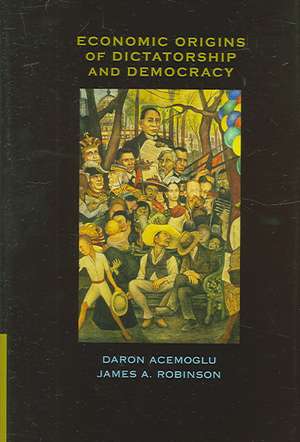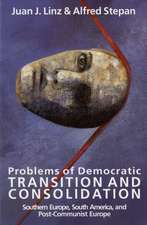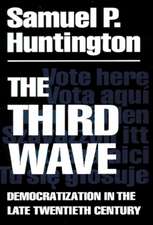Economic Origins of Dictatorship and Democracy
Autor Daron Acemoglu, James A. Robinsonen Limba Engleză Hardback – 18 dec 2005
Vezi toate premiile Carte premiată
| Toate formatele și edițiile | Preț | Express |
|---|---|---|
| Paperback (1) | 208.81 lei 3-5 săpt. | +90.02 lei 7-13 zile |
| Cambridge University Press – 8 feb 2009 | 208.81 lei 3-5 săpt. | +90.02 lei 7-13 zile |
| Hardback (1) | 585.39 lei 6-8 săpt. | |
| Cambridge University Press – 18 dec 2005 | 585.39 lei 6-8 săpt. |
Preț: 585.39 lei
Preț vechi: 657.74 lei
-11% Nou
Puncte Express: 878
Preț estimativ în valută:
112.02€ • 119.78$ • 93.40£
112.02€ • 119.78$ • 93.40£
Carte tipărită la comandă
Livrare economică 17 aprilie-01 mai
Preluare comenzi: 021 569.72.76
Specificații
ISBN-13: 9780521855266
ISBN-10: 0521855268
Pagini: 434
Ilustrații: 43 b/w illus.
Dimensiuni: 164 x 243 x 29 mm
Greutate: 0.74 kg
Editura: Cambridge University Press
Colecția Cambridge University Press
Locul publicării:New York, United States
ISBN-10: 0521855268
Pagini: 434
Ilustrații: 43 b/w illus.
Dimensiuni: 164 x 243 x 29 mm
Greutate: 0.74 kg
Editura: Cambridge University Press
Colecția Cambridge University Press
Locul publicării:New York, United States
Public țintă
Academic/professional/technical: Research and professionalCuprins
Part I. Questions and Answers; Section 1. Paths of Political Development: 1. Britain; 2. Argentina; 3. Singapore; 4. South Africa, 5. The agenda; Section 2. Our Argument: 1. Democracy vs. nondemocracy; 2. Building blocks of our approach; 3. Towards our basic story; 4. Our theory of democratization; 5. Democratic consolidation; 6. Determinants of democracy; 7. Political identities and the nature of conflict; 8. Democracy in a picture; 9. Overview of the book; Section 3. What Do We Know About Democracy?: 1. Measuring democracy; 2. Patterns of democracy; 3. Democracy, inequality and redistribution; 4. Crises and democracy; 5. Social unrest and democratization; 6. The literature; 7. Our contribution; Part II. Modelling Politics; Section 4. Democratic Politics: 1. Introduction; 2. Aggregating individual preferences; 3. Single-peaked preferences and the median voter theorem; 4. Our workhorse models; 5. Democracy and political equality; 6. Conclusion; Section 5. Nondemocratic Politics: 1. Introduction; 2. Power and constraints in nondemocratic politics; 3. Modeling preferences and constraints in nondemocracies; 4. Commitment problems; 5. A simple game of promises; 6. A dynamic model; 7. Incentive compatible promises; 8. Conclusion; Part III. The Creation and Consolidation of Democracy; Section 6. Democratization: 1. Introduction; 2. The role of political institutions; 3. Preferences over political institutions; 4. Political power and institutions; 5. A 'static' model of democratization; 6. Democratization or repression?; 7. A dynamic model of democratization; 8. Subgame perfect equilibria; 9. Alternative political identities; 10. Targeted transfers; 11. Power of the elite in democracy; 12. Ideological preferences over regimes; 13. Democratization in pictures; 14. Equilibrium revolutions; 15. Conclusion; Section 7. Coups and Consolidation: 1. Introduction; 2. Incentives for coups; 3. A static model of coups; 4. A dynamic model of the creation and consolidation of democracy; 5. Alternative political identities; 6. Targeted transfers; 7. Power in democracy and coups; 8. Consolidation in a picture; 9. Defensive coups; 10. Conclusion; Part IV. Putting the Models to Work; Section 8. The Role of the Middle Class: 1. Introduction; 2. The three-class model; 3. Emergence of partial democracy; 4. From partial to full democracy; 5. Repression: the middle class as a buffer; 6. Repression: soft-liners vs. hard-liners; 7. The role of the middle class in consolidating democracy; 8. Conclusion; Section 9. Economic Structure and Democracy: 1. Introduction; 2. Economic structure and income distribution; 3. Political conflict; 4. Capital, land and the transition to democracy; 5. Financial integration; 6. Increased political integration; 7. Alternative assumptions about the nature of international trade. 8. Conclusion; Part V. Conclusion and The Future of Democracy; Section 10. Conclusion and the Future of Democracy: 1. Paths of political development revisited; 2. Extension and areas for future research; 3. The future of democracy; Part VI. Appendix; Section 11. Appendix to Section 4: The Distribution of Power in Democracy: 1. Introduction; 2. Probabilistic voting models; 3. Lobbying; 4. Partisan politics and political capture.
Recenzii
'This path-breaking book is among the most ambitious, innovative, sweeping, and rigorous scholarly efforts in comparative political economy and political development. It offers a broad, substantial new account of the creation and consolidation of democracy. Why is the franchise extended? How do elites make reform believable and avoid expropriation? Why do revolutions nevertheless occur? Why do new democracies sometimes collapse into coups and repression? When is repression abandoned? Backed by a unified analytic model, historical insight, and extensive statistical analysis, the authors' case is compelling.' James E. Alt, Frank G. Thomson Professor of Government, Harvard University
'This tour de force combines brilliant theoretical imagination and historical breadth to shine new light on issues that have long been central in social science. The book cannot be ignored by anybody wanting to link political and economic development. Its range is truly impressive. The same logical framework offers plausible predictions about revolution, repression, democratization, and coups. The book refreshingly includes as much Latin American experience as European experience, and as much Asian as North American. The authors offer new intellectual life to economics, political science, sociology, and history. Game theory gains a wider audience by being repeatedly applied to major historical issues for which commitment is indeed a key mechanism. Economists and political scientists gain more common ground on their political economy frontier.' Peter Lindert, University of California, Davis
'Acemoglu and Robinson have developed a coherent and flexible analytical framework that brings together many aspects of the comparative political economy of democratization and democratic consolidation. Beyond being an excellent work of synthesis, this framework also leads to insights that will pave the way for further theoretical and empirical investigation. The combination of theory and historical application make this a first-rate book for teaching, as well as a major research contribution.' Thomas Romer, Princeton University
'This book is an immense achievement. Acemoglu and Robinson at once extend the frontiers of both economics and political science; they provide a new way of understanding why some countries are rich and some are poor; and they reinterpret the last 500 years of history.' Barry Weingast, Stanford University
'A vast body of research in social science on the development of democracy offers detailed accounts of specific country events but few general lessons. Acemoglu and Robinson breathe new life into this field. Relying on a sequence of formal but parsimonious game-theoretic models and on penetrating historical analysis, they provide a common understanding of the diverse country histories observed during the last two centuries,' Torsten Persson, Director, Institute for International Economics Studies, Stockholm University
'I expect Economic Origins of Dictatorship and Democracy to be highly influential. … Acemoglu and Robinson will deservedly win an audience. Students of economics will study this text as much for its methodical exposition and academic proofs as for its conclusions. They will find the effort well worthwhile.' Financial Times
'Acemoglu and Robinson have dared to set themselves up as targets. It is unlikely that the naysayers and nitpickers will be able to desist. Nor should they. And if the authors' effort survives the pounding as well it might it will be a triumph not just for Acemoglu and Robinson but for economics and its methods.' Arvind Subramanian, International Monetary Fund Journal
'I would recommend this book to anyone with a serious interest in democratic transitions and economic development. Its historical scope, and the power of the models it develops, set a new standard in political economy.' Michael Munger, EH.NET
'In this superb volume, Daron Acemoglu and James A. Robinson, seek to answer age old questions in political economy … Their answers, and the manner in which they were obtained, are refreshingly new.' Roman Wacziarg, Science
'The book is an ambitious attempt to offer tentative answers to some age-old questions in political economy and political science. … the book is well-written and structured as well as innovative and newsworthy, allowing Acemoglu & Robinson to win a general audience from political science. … the book can be useful for graduate studnets from economics with a focus on political economy.' CEU Political Science Journal
'This tour de force combines brilliant theoretical imagination and historical breadth to shine new light on issues that have long been central in social science. The book cannot be ignored by anybody wanting to link political and economic development. Its range is truly impressive. The same logical framework offers plausible predictions about revolution, repression, democratization, and coups. The book refreshingly includes as much Latin American experience as European experience, and as much Asian as North American. The authors offer new intellectual life to economics, political science, sociology, and history. Game theory gains a wider audience by being repeatedly applied to major historical issues for which commitment is indeed a key mechanism. Economists and political scientists gain more common ground on their political economy frontier.' Peter Lindert, University of California, Davis
'Acemoglu and Robinson have developed a coherent and flexible analytical framework that brings together many aspects of the comparative political economy of democratization and democratic consolidation. Beyond being an excellent work of synthesis, this framework also leads to insights that will pave the way for further theoretical and empirical investigation. The combination of theory and historical application make this a first-rate book for teaching, as well as a major research contribution.' Thomas Romer, Princeton University
'This book is an immense achievement. Acemoglu and Robinson at once extend the frontiers of both economics and political science; they provide a new way of understanding why some countries are rich and some are poor; and they reinterpret the last 500 years of history.' Barry Weingast, Stanford University
'A vast body of research in social science on the development of democracy offers detailed accounts of specific country events but few general lessons. Acemoglu and Robinson breathe new life into this field. Relying on a sequence of formal but parsimonious game-theoretic models and on penetrating historical analysis, they provide a common understanding of the diverse country histories observed during the last two centuries,' Torsten Persson, Director, Institute for International Economics Studies, Stockholm University
'I expect Economic Origins of Dictatorship and Democracy to be highly influential. … Acemoglu and Robinson will deservedly win an audience. Students of economics will study this text as much for its methodical exposition and academic proofs as for its conclusions. They will find the effort well worthwhile.' Financial Times
'Acemoglu and Robinson have dared to set themselves up as targets. It is unlikely that the naysayers and nitpickers will be able to desist. Nor should they. And if the authors' effort survives the pounding as well it might it will be a triumph not just for Acemoglu and Robinson but for economics and its methods.' Arvind Subramanian, International Monetary Fund Journal
'I would recommend this book to anyone with a serious interest in democratic transitions and economic development. Its historical scope, and the power of the models it develops, set a new standard in political economy.' Michael Munger, EH.NET
'In this superb volume, Daron Acemoglu and James A. Robinson, seek to answer age old questions in political economy … Their answers, and the manner in which they were obtained, are refreshingly new.' Roman Wacziarg, Science
'The book is an ambitious attempt to offer tentative answers to some age-old questions in political economy and political science. … the book is well-written and structured as well as innovative and newsworthy, allowing Acemoglu & Robinson to win a general audience from political science. … the book can be useful for graduate studnets from economics with a focus on political economy.' CEU Political Science Journal
Notă biografică
Descriere
This book systematically explains why some countries are democracies while others are not.
Premii
- Woodrow Wilson Foundation Award Winner, 2007























